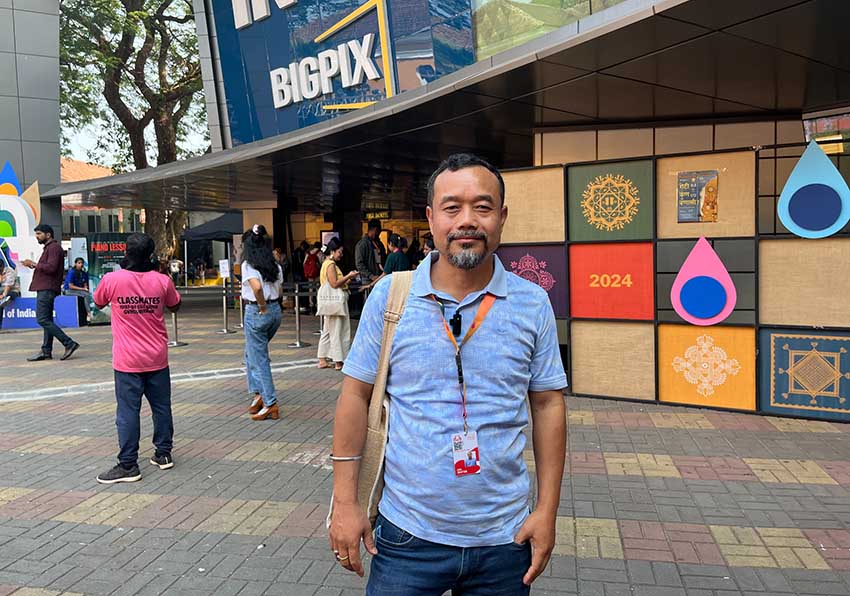The International Film Festival of India (IFFI), celebrated as the largest film festival in the country, concluded its latest edition in Goa on November 28. The festival featured a diverse selection of films from around the globe, screened across various theaters in the scenic state. A highlight of the event was the intense competition among films vying for prestigious awards across multiple categories.
One notable aspect of this year’s festival was the appointment of acclaimed Manipuri filmmaker Oinam Gautam as a jury member for the Feature Film category of the Indian Panorama. A celebrated director in his home state, Oinam Gautam’s inclusion in the jury is a testament to the growing recognition of Manipuri cinema on both national and international stages.
In a candid conversation with Imphal Review of Arts and Politics (IRAP) at INOX, Panaji, Oinam Gautam shared his experience as a jury member, offering insights into the festival and discussing ways to further elevate Manipuri cinema.
Excerpts from the interview:
IRAP: What is your perspective on the current state of Manipuri feature films, particularly as someone who served as a jury member at IFFI?
Oinam Gautam: In the past, Manipur was known for producing excellent films, but the current scenario is somewhat uncertain. We’re in a transitional phase — one where we seem to be moving toward improvement, but we haven’t yet achieved a consistent level of high-quality film production.
Most filmmakers in Manipur are focused on catering to the local market, which limits their exposure and growth. I strongly encourage Manipuri filmmakers to aim for participation in festivals like IFFI and other prestigious national and international events. These platforms offer valuable learning opportunities and expose filmmakers to broader audiences and industry standards.
That said, it’s not that all filmmakers in Manipur are falling short. There are some who are creating notable works and competing at a higher level. However, when we compare the overall output with other states, we lag behind in terms of quality. For instance, this year, Assam had a significant presence at IFFI, even surpassing West Bengal in terms of the number of entries. Unfortunately, Manipuri cinema hasn’t reached that level yet, and there’s a lot of room for growth.
IRAP: What steps can be taken to improve Manipuri feature films, and what do you think Manipuri filmmakers need to learn to enhance their craft?
Oinam Gautam: Most filmmakers in Manipur are self-taught, which has its limitations. If we continue creating films in isolation, without learning new techniques or engaging with broader cinematic conversations, growth will be difficult. This is why exposure to platforms like IFFI is so crucial. It’s encouraging to see that students from Manipur participated in IFFI this year, as these experiences are essential for development.
We now have a growing number of emerging filmmakers in Manipur. While some are gaining exposure, many have yet to step into active production. In the past, our lack of exposure to major film festivals led us to believe that the films confined to Manipur represented the entirety of our cinematic potential. This limited perspective is one of the barriers we need to overcome.
To improve, Manipuri filmmakers need to foster a culture of collaboration and dialogue. We should begin sharing ideas and engaging in discussions even at the scripting stage. This collaborative approach will help us refine our concepts and techniques. Regular discussions on how to create better films and improve production quality are crucial for the growth of Manipuri cinema.
IRAP: In terms of technical aspects, storytelling, or other areas, what improvements are needed to elevate the quality of Manipuri films?
Oinam Gautam: Across the board—whether in storytelling, technical expertise, or equipment—Manipur lags behind. For instance, when new cameras or technology are introduced, we often focus on their quality and output without fully exploring how they can be utilized to their maximum potential. This limits our ability to innovate technically.
On the storytelling front, we see a recurring trend of family dramas and narratives that feel overly familiar. Our stories tend to be confined to a narrow scope, targeted primarily at local audiences. While commercial viability is important, filmmakers should strive for originality and explore themes beyond the usual mold.
At this year’s IFFI, we selected several commercial films for the mainstream category. What stood out was how many of them were well-made and deserving of recognition. This made me reflect: had we approached commercial filmmaking in Manipur with greater seriousness and effort in the past, some of our successful local films might have been contenders at festivals like IFFI.
Manipur is rich in content and stories, but we lack the skilled individuals who can transform these into compelling feature films. The potential is there, but it requires commitment to improving both the technical and creative aspects of filmmaking.
IRAP: Do you think filmmakers and film enthusiasts should consider IFFI an essential festival to attend?
Oinam Gautam: Absolutely. Manipuri filmmakers need much more exposure, and attending festivals like IFFI is crucial. Even if our films don’t get selected, filmmakers should register as delegates and participate. Watching a wide variety of films at such festivals broadens perspectives and inspires creativity. It’s not just about having your film screened but also about learning and gaining insights.
Participation in IFFI and events like the Film Bazaar is particularly important. Personally, before I achieved recognition through a national award or selections at IFFI, I attended as a delegate. Watching numerous films during those visits gave me fresh ideas and a deeper understanding of filmmaking. It’s an invaluable experience.
In addition to seeking exposure, we must also prioritize improving technical quality. While Manipur has an abundance of rich content, the lack of trained professionals to transform these stories into technically proficient films remains a challenge. Festivals like IFFI can be a stepping stone for addressing these gaps.
IRAP: You’ve emphasized the need for discussions to improve Manipuri films. How do you propose creating an environment conducive to such discussions among filmmakers?
Oinam Gautam: I’ve already suggested this idea to some of my fellow Manipuri filmmakers—creating a space where we can openly discuss and provide feedback while our films are still in the developmental stage, such as during pre-production or post-production. This concept has been initiated on a small scale, but it needs to be expanded and institutionalized.
One approach could be revisiting successful films from the past and analyzing them collectively to identify what worked and what could be improved. These discussions could serve as a foundation for producing better-quality films in the future.
We are fortunate to have filmmakers in Manipur who have gained exposure at national and international platforms. It’s crucial for them to share their experiences, insights, and ideas with the community. By fostering a collaborative environment where filmmakers can pool their knowledge and learn from each other, we can elevate the standard of our films.
At this stage, many of us are beyond the age to enroll in formal film schools. Instead, we need to create our own platform for learning—one where open dialogue, constructive criticism, and the exchange of ideas can thrive. This will help us incorporate diverse perspectives and improve the overall quality of Manipuri cinema.












